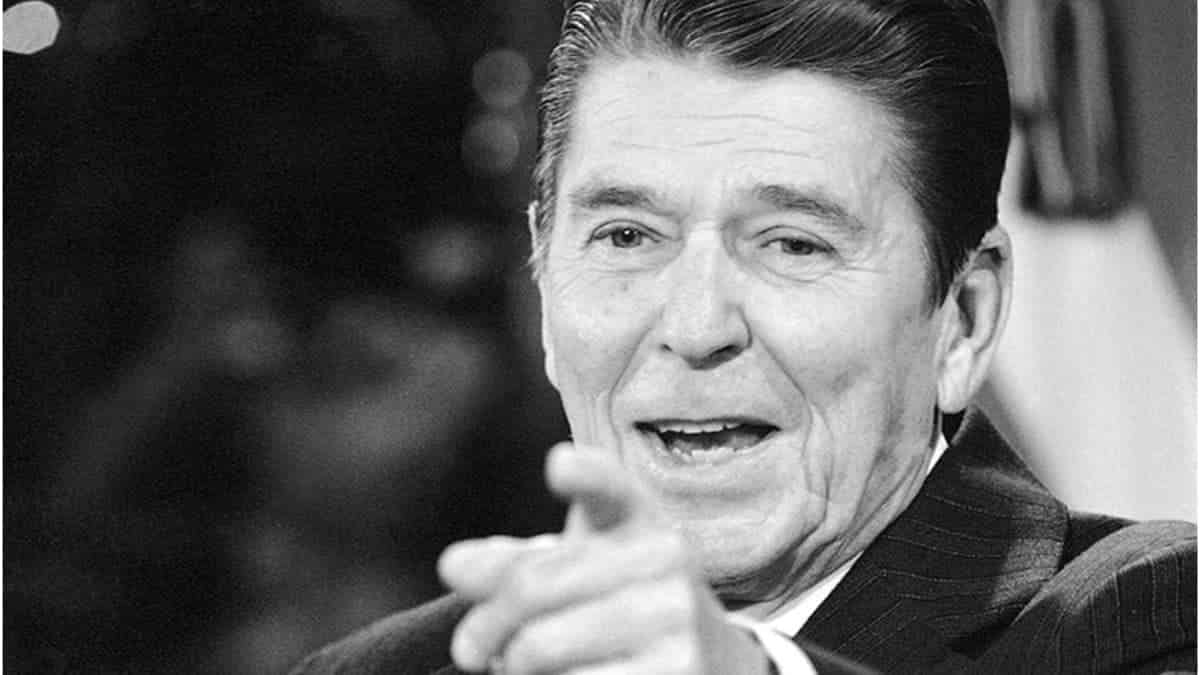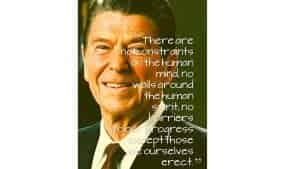Ronald Reagan – The journey of courageous presidency

Ronald W. Reagan was the 40th president of the U.S. (1981–89). He was born on Feb. 6, 1911, in Tampico, U.S, and died on June 5, 2004, in Los Angeles, California. Ronald is the only actor ever to become president. He is known for being a remarkable orator that also earned him the title “the Great Communicator.” He introduced policies that contributed to the demise of Soviet communism(Communist Party of Soviet Union).
Ronald Reagan Career –
Ronald Reagan graduated in 1932 with a bachelor’s degree in economics and sociology. He then entered radio broadcasting. After which he landed a job as a sportscaster(commentator).
Ronald Reagan in Hollywood –
Then he proceeded to Hollywood in 1937. In his career as a movie actor, he appeared in more than 50 films, in his 27 years Hollywood journey. He was twice president of the Screen Actors Guild also. His notable films include- Knute Rockne—All American (1940), Kings Row (1942), and The Hasty Heart (1950).
Reagan absorbed the liberal opinions of his father. He was a great admirer of Franklin Roosevelt(32nd U.S. President). Reagan campaigned actively for Richard Nixon(37th U.S. President), for supporting him to become governor of California, in 1962. He also supported Barry Goldwater, in 1964.
In the campaign, he delivered a nationally televised address, “A Time for Choosing,” that The Washington Post described as “the most successful political debut since William Jennings Bryan electrified the 1896 Democratic convention with his ‘Cross of Gold’ speech.”
Reagan’s speech, which resulted in $1 million in campaign contributions for Republican candidates (the most attributable to any political speech in history), raised him onto the national political stage. This also made Ronald an instant hero of the Republican right among people. Reagan announced his candidacy for governor of California in 1966.

Presidency of Ronald Reagan – First term(1979 – 1985) –
Reagan won the election by around 1 million votes. The public also reacted well to Reagan’s personality, genuineness, affability, sense of humor. (Once asked by a reporter how he would perform in office after becoming Governor, Reagan replied, “I don’t know. I’ve never played a governor.”) Shortly after acquiring Presidency, he was wounded in an assassination attempt. On March 30, 1981, a deranged drifter named John W. Hinckley Jr., fired 6 shots( .22-calibre revolver) at Reagan. In which, one of the bullets entered Reagan’s chest, puncturing a lung and lodging one inch from his heart. Reagan joked with doctors as he was being wheeled into the operating room: “I hope you’re all Republicans”, that was one of his proof of courage, even when one is fighting with his own life.
Ronald Reagan – Domestic Policies –
Following the so-called “Supply-Side” economic program he propounded in his campaign, Reagan proposed massive tax cuts—30 percent reductions in both individual and corporate income taxes over a three-year period—which he believed would stimulate the economy and eventually increase revenues from taxes as income levels grew. At the same time, he proposed large increases in military expenditures ($1.5 trillion over a five-year period) and significant cuts in “discretionary” spending on social-welfare programs such as education, food stamps, school lunches for poor children, Health Insurance for the poor, and Aid to Families with Dependent Children. In 1981 Congress passed most of the president’s budget proposals, though the tax cut was scaled back slightly, to 25 percent. These all policies succeeded in lowering the inflation rate in the country, at that time.
He made the largest peacetime military buildup in U.S. history, in 1983. He proposed the construction of the Strategic Defense Initiative.
Relations of Ronald Reagan with the Soviet Union –
U.S.-Soviet relations improved considerably during Reagan’s 2nd term presidency. Reagan and Gorbachev met for the first time in November 1985, in Geneva, to discuss reductions in nuclear weapons. In October 1986, Gorbachev proposed a 50 percent reduction in the nuclear arsenals of each side, and for a time it seemed as though a historic agreement would be reached. But the summit ended in failure, it was followed up in December 1987 by a treaty eliminating INF (Intermediate-range nuclear forces) on European soil. The INF treaty was the first arms-control pact to require an actual reduction in nuclear arsenals rather than merely restricting their proliferation.
Later, he invaded the Island of Grenada ostensibly to prevent the island nation from becoming a Soviet outpost.
Ronald Reagan 2nd term of Presidency –
Ronald was re-elected by a large margin in 1984. Beginning in 1986, the Iran-Contra Affair temporarily weakened his presidency. Though his intellectual capacity for governing was often disparaged by his critics, his affability and artful communication skills enabled him to pursue numerous conservative policies with conspicuous success, and his tough stance toward the Soviet Union is often credited with contributing to the demise of Soviet communism. In 1994 he revealed that he had Alzheimer disease, reported as from biography of Ronald Reagan from sources.


